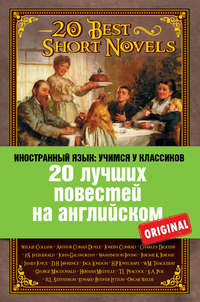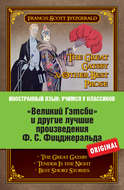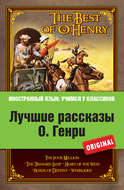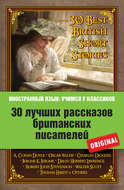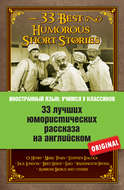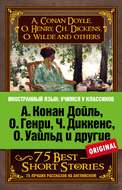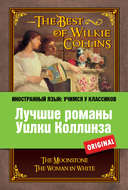Kitobni o'qish: «20 лучших повестей на английском / 20 Best Short Novels»
© Самуэльян Н. А., составление комментариев, 2014
© ООО «Издательство «Эксмо», 2014
Все права защищены. Никакая часть электронной версии этой книги не может быть воспроизведена в какой бы то ни было форме и какими бы то ни было средствами, включая размещение в сети Интернет и в корпоративных сетях, для частного и публичного использования без письменного разрешения владельца авторских прав.
* * *
Edward Bulwer Lytton
The Haunted and the Haunters; or, The House and the Brain
A friend of mine, who is a man of letters and a philosopher, said to me one day, as if between jest and earnest, ‘Fancy! since we last met I have discovered a haunted house in the midst of London.’
‘Really haunted, – and by what? – ghosts?’
‘Well, I can’t answer that question; all I know is this: six weeks ago my wife and I were in search of a furnished apartment. Passing a quiet street, we saw on the window of one of the houses a bill, “Apartments, Furnished.” The situation suited us; we entered the house, liked the rooms, engaged them by the week, – and left them the third day. No power on earth could have reconciled my wife to stay longer; and I don’t wonder at it.’
‘What did you see?’
‘Excuse me; I have no desire to be ridiculed as a superstitious dreamer, – nor, on the other hand, could I ask you to accept on my affirmation what you would hold to be incredible without the evidence of your own senses. Let me only say this, it was not so much what we saw or heard (in which you might fairly suppose that we were the dupes of our own excited fancy, or the victims of imposture in others) that drove us away, as it was an indefinable terror which seized both of us whenever we passed by the door of a certain unfurnished room, in which we neither saw nor heard anything. And the strangest marvel of all was, that for once in my life I agreed with my wife, silly woman though she be, – and allowed, after the third night, that it was impossible to stay a fourth in that house. Accordingly, on the fourth morning I summoned the woman who kept the house and attended on us, and told her that the rooms did not quite suit us, and we would not stay out our week. She said dryly, “I know why; you have stayed longer than any other lodger. Few ever stayed a second night; none before you a third. But I take it they have been very kind to you.”
‘“They, – who?” I asked, affecting to smile.
‘“Why, they who haunt the house, whoever they are. I don’t mind them. I remember them many years ago, when I lived in this house, not as a servant; but I know they will be the death of me some day. I don’t care, – I’m old, and must die soon anyhow; and then I shall be with them, and in this house still.’ The woman spoke with so dreary a calmness that really it was a sort of awe that prevented my conversing with her further. I paid for my week, and too happy were my wife and I to get off so cheaply.”
‘You excite my curiosity,’ said I; ‘nothing I should like better than to sleep in a haunted house. Pray give me the address of the one which you left so ignominiously.’
My friend gave me the address; and when we parted, I walked straight towards the house thus indicated.
It is situated on the north side of Oxford Street1, in a dull but respectable thoroughfare. I found the house shut up, – no bill at the window, and no response to my knock. As I was turning away, a beer-boy, collecting pewter pots at the neighboring areas, said to me, ‘Do you want any one at that house, sir?’
‘Yes, I heard it was to be let.’
‘Let! – why, the woman who kept it is dead, – has been dead these three weeks, and no one can be found to stay there, though Mr. J– offered ever so much. He offered mother, who chars for him, £1 a week just to open and shut the windows, and she would not.’
‘Would not! – and why?’
‘The house is haunted; and the old woman who kept it was found dead in her bed, with her eyes wide open. They say the devil strangled her.’
‘Pooh! You speak of Mr. J—. Is he the owner of the house?’
‘Yes.’
‘Where does he live?’
‘In G– Street, No.—.’
‘What is he? In any business?’
‘No, sir, – nothing particular; a single gentleman.’
I gave the pot-boy2 the gratuity earned by his liberal information, and proceeded to Mr. J—, in G– Street, which was close by the street that boasted the haunted house. I was lucky enough to find Mr. J– at home, – an elderly man with intelligent countenance and prepossessing manners.
I communicated my name and my business frankly. I said I heard the house was considered to be haunted, – that I had a strong desire to examine a house with so equivocal a reputation; that I should be greatly obliged if he would allow me to hire it, though only for a night. I was willing to pay for that privilege whatever he might be inclined to ask. ‘Sir,’ said Mr. J—, with great courtesy, ‘the house is at your service, for as short or as long a time as you please. Rent is out of the question, – the obligation will be on my side should you be able to discover the cause of the strange phenomena3 which at present deprive it of all value. I cannot let it, for I cannot even get a servant to keep it in order or answer the door. Unluckily the house is haunted, if I may use that expression, not only by night, but by day; though at night the disturbances are of a more unpleasant and sometimes of a more alarming character. The poor old woman who died in it three weeks ago was a pauper whom I took out of a workhouse; for in her childhood she had been known to some of my family, and had once been in such good circumstances that she had rented that house of my uncle. She was a woman of superior education and strong mind, and was the only person I could ever induce to remain in the house. Indeed, since her death, which was sudden, and the coroner’s4 inquest, which gave it a notoriety in the neighborhood, I have so despaired of finding any person to take charge of the house, much more a tenant, that I would willingly let it rent free for a year to any one who would pay its rates and taxes.’
‘How long is it since the house acquired this sinister character?’
‘That I can scarcely tell you, but very many years since. The old woman I spoke of, said it was haunted when she rented it between thirty and forty years ago. The fact is, that my life has been spent in the East Indies, and in the civil service of the Company5. I returned to England last year, on inheriting the fortune of an uncle, among whose possessions was the house in question. I found it shut up and uninhabited. I was told that it was haunted, that no one would inhabit it. I smiled at what seemed to me so idle a story. I spent some money in repairing it, added to its old-fashioned furniture a few modern articles, – advertised it, and obtained a lodger for a year. He was a colonel on half-pay. He came in with his family, a son and a daughter, and four or five servants: they all left the house the next day; and, although each of them declared that he had seen something different from that which had scared the others, a something still was equally terrible to all. I really could not in conscience sue, nor even blame, the colonel for breach of agreement. Then I put in the old woman I have spoken of, and she was empowered to let the house in apartments. I never had one lodger who stayed more than three days. I do not tell you their stories, – to no two lodgers have there been exactly the same phenomena repeated. It is better that you should judge for yourself, than enter the house with an imagination influenced by previous narratives; only be prepared to see and to hear something or other, and take whatever precautions you yourself please.’
‘Have you never had a curiosity yourself to pass a night in that house?’ ‘Yes. I passed not a night, but three hours in broad daylight alone in that house. My curiosity is not satisfied, but it is quenched. I have no desire to renew the experiment. You cannot complain, you see, sir, that I am not sufficiently candid; and unless your interest be exceedingly eager and your nerves unusually strong, I honestly add, that I advise younot to pass a night in that house.’
‘My interestis exceedingly keen,’ said I; ‘and though only a coward will boast of his nerves in situations wholly unfamiliar to him, yet my nerves have been seasoned in such variety of danger that I have the right to rely on them, – even in a haunted house.’
Mr. J– said very little more; he took the keys of the house out of his bureau6, gave them to me, – and, thanking him cordially for his frankness, and his urbane concession to my wish, I carried off my prize.
Impatient for the experiment, as soon as I reached home, I summoned my confidential servant, – a young man of gay spirits, fearless temper, and as free from superstitious prejudice as any one I could think of.
‘F—,’ said I, ‘you remember in Germany how disappointed we were at not finding a ghost in that old castle, which was said to be haunted by a headless apparition? Well, I have heard of a house in London which, I have reason to hope, is decidedly haunted. I mean to sleep there to-night. From what I hear, there is no doubt that something will allow itself to be seen or to be heard, – something, perhaps, excessively horrible. Do you think if I take you with me, I may rely on your presence of mind, whatever may happen?’
‘Oh, sir, pray trust me,’ answered F—, grinning with delight.
‘Very well; then here are the keys of the house, – this is the address. Go now, – select for me any bedroom you please; and since the house has not been inhabited for weeks, make up a good fire, air the bed well, – see, of course, that there are candles as well as fuel. Take with you my revolver and my dagger, – so much for my weapons; arm yourself equally well; and if we are not a match for a dozen ghosts, we shall be but a sorry couple of Englishmen.’
I was engaged for the rest of the day on business so urgent that I had not leisure to think much on the nocturnal adventure to which I had plighted my honor. I dined alone, and very late, and while dining, read, as is my habit. I selected one of the volumes of Macaulay7’s Essays. I thought to myself that I would take the book with me; there was so much of healthfulness in the style, and practical life in the subjects, that it would serve as an antidote against the influences of superstitious fancy.
Accordingly, about half-past nine, I put the book into my pocket, and strolled leisurely towards the haunted house. I took with me a favorite dog: an exceedingly sharp, bold, and vigilant bull-terrier, – a dog fond of prowling about strange, ghostly corners and passages at night in search of rats; a dog of dogs for a ghost.
It was a summer night but chilly, the sky somewhat gloomy and overcast. Still there was a moon, faint and sickly but still a moon, and if the clouds permitted, after midnight it would be brighter.
I reached the house, knocked, and my servant opened with a cheerful smile.
‘All right, sir, and very comfortable.’
‘Oh!’ said I, rather disappointed; ‘have you not seen nor heard anything remarkable?’
‘Well, sir, I must own I have heard something queer.’
‘What? – what?’
‘The sound of feet pattering behind me; and once or twice small noises like whispers close at my ear, – nothing more.’
‘You are not at all frightened?’
‘I! not a bit of it, sir;’ and the man’s bold look reassured me on one point, – namely, that happen what might, he would not desert me.
We were in the hall, the street-door closed, and my attention was now drawn to my dog. He had at first run in eagerly enough, but had sneaked back to the door, and was scratching and whining to get out. After patting him on the head, and encouraging him gently, the dog seemed to reconcile himself to the situation, and followed me and F – through the house, but keeping close at my heels instead of hurrying inquisitively in advance, which was his usual and normal habit in all strange places. We first visited the subterranean apartments, – the kitchen and other offices, and especially the cellars, in which last there were two or three bottles of wine still left in a bin, covered with cobwebs, and evidently, by their appearance, undisturbed for many years. It was clear that the ghosts were not winebibbers. For the rest we discovered nothing of interest. There was a gloomy little backyard, with very high walls. The stones of this yard were very damp; and what with the damp, and what with the dust and smoke-grime on the pavement, our feet left a slight impression where we passed. And now appeared the first strange phenomenon witnessed by myself in this strange abode. I saw, just before me, the print of a foot suddenly form itself, as it were. I stopped, caught hold of my servant, and pointed to it. In advance of that footprint as suddenly dropped another. We both saw it. I advanced quickly to the place; the footprint kept advancing before me, a small footprint, – the foot of a child: the impression was too faint thoroughly to distinguish the shape, but it seemed to us both that it was the print of a naked foot. This phenomenon ceased when we arrived at the opposite wall, nor did it repeat itself on returning. We remounted the stairs, and entered the rooms on the ground-floor, a dining parlor, a small back-parlor, and a still smaller third room that had been probably appropriated to a footman, – all still as death. We then visited the drawing-rooms, which seemed fresh and new. In the front room I seated myself in an arm-chair. F– placed on the table the candlestick with which he had lighted us. I told him to shut the door. As he turned to do so a chair opposite to me moved from the wall quickly and noiselessly, and dropped itself about a yard from my own chair, immediately fronting it.
‘Why, this is better than the turning-tables,’ said I, with a half-laugh; and as I laughed, my dog put back his head and howled.
F—, coming back, had not observed the movement of the chair. He employed himself now in stilling the dog. I continued to gaze on the chair, and fancied I saw on it a pale, blue, misty outline of a human figure, but an outline so indistinct that I could only distrust my own vision. The dog now was quiet.
‘Put back that chair opposite to me,’ said I to F—; ‘put it back to the wall.’
F– obeyed. ‘Was that you, sir?’ said he, turning abruptly.
‘I! – what?’
‘Why, something struck me. I felt it sharply on the shoulder, – just here.’
‘No,’ said I. ‘But we have jugglers8 present, and though we may not discover their tricks, we shall catch them before they frighten us.’
We did not stay long in the drawing-rooms, – in fact, they felt so damp and so chilly that I was glad to get to the fire upstairs. We locked the doors of the drawing-rooms, – a precaution which, I should observe, we had taken with all the rooms we had searched below. The bedroom my servant had selected for me was the best on the floor, – a large one, with two windows fronting the street. The four-posted bed, which took up no inconsiderable space, was opposite to the fire, which burned clear and bright; a door in the wall to the left, between the bed and the window, communicated with the room which my servant appropriated to himself. This last was a small room with a sofa-bed, and had no communication with the landing-place, – no other door but that which conducted to the bedroom I was to occupy. On either side of my fireplace was a cupboard without locks, flush with the wall, and covered with the same dull-brown paper. We examined these cupboards, – only hooks to suspend female dresses, nothing else; we sounded the walls, – evidently solid, the outer walls of the building. Having finished the survey of these apartments, warmed myself a few moments, and lighted my cigar, I then, still accompanied by F—, went forth to complete my reconnoitre. In the landing-place there was another door; it was closed firmly. ‘Sir,’ said my servant, in surprise, ‘I unlocked this door with all the others when I first came; it cannot have got locked from the inside, for—’
Before he had finished his sentence, the door, which neither of us then was touching, opened quietly of itself. We looked at each other a single instant. The same thought seized both, – some human agency might be detected here. I rushed in first, my servant followed. A small, blank, dreary room without furniture; a few empty boxes and hampers in a corner; a small window; the shutters closed; not even a fireplace; no other door but that by which we had entered; no carpet on the floor, and the floor seemed very old, uneven, worm-eaten, mended here and there, as was shown by the whiter patches on the wood; but no living being, and no visible place in which a living being could have hidden. As we stood gazing round, the door by which we had entered closed as quietly as it had before opened; we were imprisoned.
For the first time I felt a creep of indefinable horror. Not so my servant. ‘Why, they don’t think to trap us, sir; I could break that trumpery door with a kick of my foot.’
‘Try first if it will open to your hand,’ said I, shaking off the vague apprehension that had seized me, ‘while I unclosed the shutters and see what is without.’
I unbarred the shutters, – the window looked on the little backyard I have before described; there was no ledge without, – nothing to break the sheer descent of the wall. No man getting out of that window would have found any footing till he had fallen on the stones below.
F—, meanwhile, was vainly attempting to open the door. He now turned round to me and asked my permission to use force. And I should here state, in justice to the servant, that, far from evincing any superstitious terrors, his nerve, composure, and even gayety amidst circumstances so extraordinary, compelled my admiration, and made me congratulate myself on having secured a companion in every way fitted to the occasion. I willingly gave him the permission he required. But though he was a remarkably strong man, his force was as idle as his milder efforts; the door did not even shake to his stoutest kick. Breathless and panting, he desisted. I then tried the door myself, equally in vain. As I ceased from the effort, again that creep of horror came over me; but this time it was more cold and stubborn. I felt as if some strange and ghastly exhalation were rising up from the chinks of that rugged floor, and filling the atmosphere with a venomous influence hostile to human life. The door now very slowly and quietly opened as of its own accord. We precipitated ourselves into the landing-place. We both saw a large, pale light – as large as the human figure, but shapeless and unsubstantial – move before us, and ascend the stairs that led from the landing into the attics. I followed the light, and my servant followed me. It entered, to the right of the landing, a small garret, of which the door stood open. I entered in the same instant. The light then collapsed into a small globule, exceedingly brilliant and vivid, rested a moment on a bed in the corner, quivered, and vanished. We approached the bed and examined it, – a half-tester, such as is commonly found in attics devoted to servants. On the drawers that stood near it we perceived an old faded silk kerchief, with the needle still left in a rent half repaired. The kerchief was covered with dust; probably it had belonged to the old woman who had last died in that house, and this might have been her sleeping-room. I had sufficient curiosity to open the drawers: there were a few odds and ends of female dress, and two letters tied round with a narrow ribbon of faded yellow. I took the liberty to possess myself of the letters. We found nothing else in the room worth noticing, – nor did the light reappear; but we distinctly heard, as we turned to go, a pattering footfall on the floor, just before us. We went through the other attics9 (in all four), the footfall still preceding us. Nothing to be seen, – nothing but the footfall heard. I had the letters in my hand; just as I was descending the stairs I distinctly felt my wrist seized, and a faint, soft effort made to draw the letters from my clasp. I only held them the more tightly, and the effort ceased.
We regained the bedchamber appropriated to myself, and I then remarked that my dog had not followed us when we had left it. He was thrusting himself close to the fire, and trembling. I was impatient to examine the letters; and while I read them, my servant opened a little box in which he had deposited the weapons I had ordered him to bring, took them out, placed them on a table close at my bed-head, and then occupied himself in soothing the dog, who, however, seemed to heed him very little.
The letters were short, – they were dated; the dates exactly thirty-five years ago. They were evidently from a lover to his mistress, or a husband to some young wife. Not only the terms of expression, but a distinct reference to a former voyage, indicated the writer to have been a seafarer. The spelling and handwriting were those of a man imperfectly educated, but still the language itself was forcible. In the expressions of endearment there was a kind of rough, wild love; but here and there were dark unintelligible hints at some secret not of love, – some secret that seemed of crime. ‘We ought to love each other,’ was one of the sentences I remember, ‘for how every one else would execrate us if all was known.’ Again: ‘Don’t let any one be in the same room with you at night, – you talk in your sleep.’ And again: ‘What’s done can’t be undone; and I tell you there’s nothing against us unless the dead could come to life.’ Here there was underlined in a better handwriting (a female’s), ‘They do!’ At the end of the letter latest in date the same female hand had written these words: ‘Lost at sea the 4th of June, the same day as—’
I put down the letters, and began to muse over their contents.
Fearing, however, that the train of thought into which I fell might unsteady my nerves, I fully determined to keep my mind in a fit state to cope with whatever of marvellous the advancing night might bring forth. I roused myself; laid the letters on the table; stirred up the fire, which was still bright and cheering; and opened my volume of Macaulay. I read quietly enough till about half-past eleven. I then threw myself dressed upon the bed, and told my servant he might retire to his own room, but must keep himself awake. I bade him leave open the door between the two rooms. Thus alone, I kept two candles burning on the table by my bed-head. I placed my watch beside the weapons, and calmly resumed my Macaulay. Opposite to me the fire burned clear; and on the hearthrug, seemingly asleep, lay the dog. In about twenty minutes I felt an exceedingly cold air pass by my cheek, like a sudden draught. I fancied the door to my right, communicating with the landing-place, must have got open; but no, – it was closed. I then turned my glance to my left, and saw the flame of the candles violently swayed as by a wind. At the same moment the watch beside the revolver softly slid from the table, – softly, softly; no visible hand, – it was gone. I sprang up, seizing the revolver with the one hand, the dagger with the other; I was not willing that my weapons should share the fate of the watch. Thus armed, I looked round the floor, – no sign of the watch. Three slow, loud, distinct knocks were now heard at the bed-head; my servant called out, ‘Is that you, sir?’
‘No; be on your guard.’
The dog now roused himself and sat on his haunches, his ears moving quickly backwards and forwards. He kept his eyes fixed on me with a look so strange that he concentred all my attention on himself. Slowly he rose up, all his hair bristling, and stood perfectly rigid, and with the same wild stare. I had no time, however, to examine the dog. Presently my servant emerged from his room; and if ever I saw horror in the human face, it was then. I should not have recognized him had we met in the street, so altered was every lineament. He passed by me quickly, saying, in a whisper that seemed scarcely to come from his lips, ‘Run, run! it is after me!’ He gained the door to the landing, pulled it open, and rushed forth. I followed him into the landing involuntarily, calling him to stop; but, without heeding me, he bounded down the stairs, clinging to the balusters10, and taking several steps at a time. I heard, where I stood, the street-door open, – heard it again clap to. I was left alone in the haunted house.
It was but for a moment that I remained undecided whether or not to follow my servant; pride and curiosity alike forbade so dastardly a flight. I re-entered my room, closing the door after me, and proceeded cautiously into the interior chamber. I encountered nothing to justify my servant’s terror. I again carefully examined the walls, to see if there were any concealed door. I could find no trace of one, – not even a seam in the dull-brown paper with which the room was hung. How, then, had the THING, whatever it was, which had so scared him, obtained ingress except through my own chamber?
I returned to my room, shut and locked the door that opened upon the interior one, and stood on the hearth, expectant and prepared. I now perceived that the dog had slunk into an angle of the wall, and was pressing himself close against it, as if literally striving to force his way into it. I approached the animal and spoke to it; the poor brute was evidently beside itself with terror. It showed all its teeth, the slaver dropping from its jaws, and would certainly have bitten me if I had touched it. It did not seem to recognize me. Whoever has seen at the Zoological Gardens a rabbit, fascinated by a serpent, cowering in a corner, may form some idea of the anguish which the dog exhibited. Finding all efforts to soothe the animal in vain, and fearing that his bite might be as venomous in that state as in the madness of hydrophobia11, I left him alone, placed my weapons on the table beside the fire, seated myself, and recommenced my Macaulay.
Perhaps, in order not to appear seeking credit for a courage, or rather a coolness, which the reader may conceive I exaggerate, I may be pardoned if I pause to indulge in one or two egotistical remarks.
As I hold presence of mind, or what is called courage, to be precisely proportioned to familiarity with the circumstances that lead to it, so I should say that I had been long sufficiently familiar with all experiments that appertain to the marvellous. I had witnessed many very extraordinary phenomena in various parts of the world, – phenomena that would be either totally disbelieved if I stated them, or ascribed to supernatural agencies. Now, my theory is that the supernatural is the impossible, and that what is called supernatural is only a something in the laws of Nature of which we have been hitherto ignorant. Therefore, if a ghost rise before me, I have not the right to say, ‘So, then, the supernatural is possible;’ but rather, ‘So, then, the apparition of a ghost, is, contrary to received opinion, within the laws of Nature, – that is, not supernatural.’
Now, in all that I had hitherto witnessed, and indeed in all the wonders which the amateurs of mystery in our age record as facts, a material living agency is always required. On the Continent you will find still magicians who assert that they can raise spirits. Assume for the moment that they assert truly, still the living material form of the magician is present; and he is the material agency by which, from some constitutional peculiarities, certain strange phenomena are represented to your natural senses.
Accept, again, as truthful, the tales of spirit-manifestation in America, – musical or other sounds; writings on paper, produced by no discernible hand; articles of furniture moved without apparent human agency; or the actual sight and touch of hands, to which no bodies seem to belong, – still there must be found the MEDIUM12, or living being, with constitutional peculiarities capable of obtaining these signs. In fine, in all such marvels, supposing even that there is no imposture, there must be a human being like ourselves by whom, or through whom, the effects presented to human beings are produced. It is so with the now familiar phenomena of mesmerism13 or electro-biology; the mind of the person operated on is affected through a material living agent. Nor, supposing it true that a mesmerized14 patient can respond to the will or passes of a mesmerizer15 a hundred miles distant, is the response less occasioned by a material being; it may be through a material fluid – call it Electric, call it Odic, call it what you will – which has the power of traversing space and passing obstacles, that the material effect is communicated from one to the other. Hence, all that I had hitherto witnessed, or expected to witness, in this strange house, I believed to be occasioned through some agency or medium as mortal as myself; and this idea necessarily prevented the awe with which those who regard as supernatural things that are not within the ordinary operations of Nature, might have been impressed by the adventures of that memorable night.
As, then, it was my conjecture that all that was presented, or would be presented to my senses, must originate in some human being gifted by constitution with the power so to present them, and having some motive so to do, I felt an interest in my theory which, in its way, was rather philosophical than superstitious. And I can sincerely say that I was in as tranquil a temper for observation as any practical experimentalist could be in awaiting the effects of some rare, though perhaps perilous, chemical combination. Of course, the more I kept my mind detached from fancy, the more the temper fitted for observation would be obtained; and I therefore riveted eye and thought on the strong daylight sense in the page of my Macaulay.
I now became aware that something interposed between the page and the light, – the page was over-shadowed. I looked up, and I saw what I shall find it very difficult, perhaps impossible, to describe.
